Christian-History.org does not receive any personally identifiable information from the search bar below.
About Paul Pavao and Christian History for Everyman
My name is Paul Pavao, and I became a Christian in 1982. You can read some of my personal story here, so I will limit this page to the items that should matter most to those who want more information about me and Christian-history.org.
Additionally, someone pointed out I haven't updated this page since mentioning leukemia. I survived leukemia and a secondary lymphoma. It is 2020, and I am alive, writing books, and serving the Lord. See the Navbar for my books.
Are you on this page for my qualifications?
- As of 2019, I have been reading the writings of the early church fathers for 29 years and discussing them with others who read them.
- I have no degrees. I dropped out of college my sophomore year because of disinterest. I was purposeless and bored. Only a couple years later, I became a Christian and have been researching and teaching the foundations of the Christian faith the last 37 years.
- I am an excellent student and a Mensa member. That said, God opposes the wise of this world, so my real qualification is that I know deeply to lean not to my own understanding, but in all my ways to acknowledge him. To me this means humbly learning from spiritual men good spiritual fruit.
- The testimonies that I link to on the home page and those found in the Amazon reviews of Decoding Nicea.
- The following men promote and support my teaching: Glenn Roseberry, missionary to Kenya; John Tancock, "the Welsh apologist" and church planter; David Taylor, founder of Stonehouse Ministries International
About Me
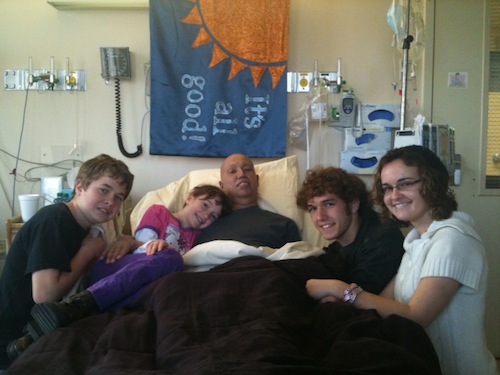
February, 2012, about a month after my bone marrow transplant. I was in pretty bad shape at that point and working hard to be cheerful. Those are my four youngest children.
In 1984, I read Gene Edwards' book, The Early Church, which is now called Revolution: The Story of the Early Church, and has lost a couple chapters. His book created a fire in me for the church. I longed for the raw, wild, and together devotion to God that I saw in his retelling of the Book of Acts.
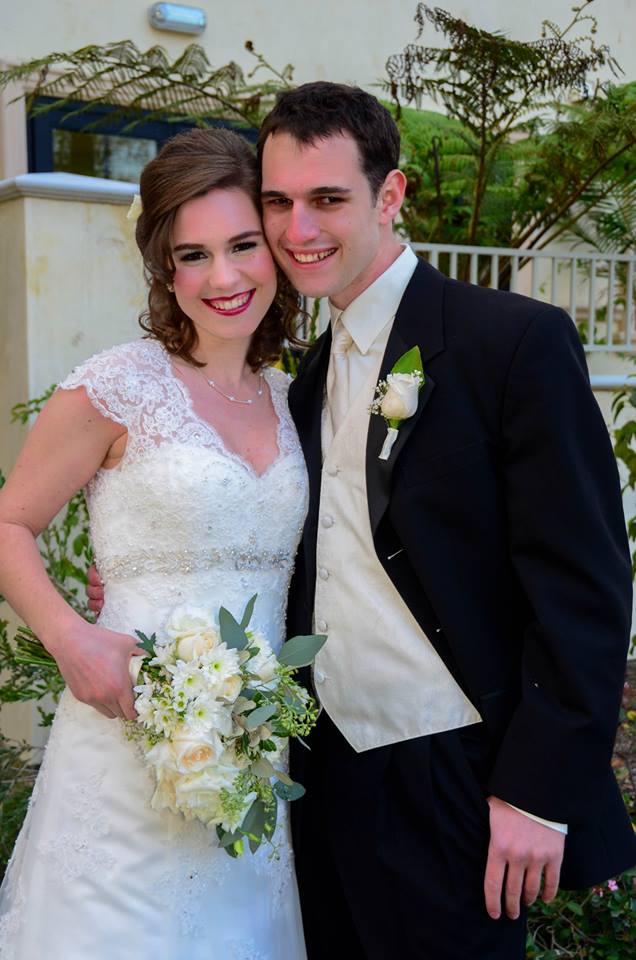 My oldest son, Zerubbabel (Zube), and his lovely bride, Katie. Married in February, 2013.
My oldest son, Zerubbabel (Zube), and his lovely bride, Katie. Married in February, 2013.I spent the next 12 years searching for an expression of church life that looked anything like what I read about in the Book of Acts. I started home churches, joined home churches, and searched in traditional evangelical churches.
In 1995, I met Noah Taylor, from a church in Geneva, Florida. The church was highly influenced by Watchman Nee, one of my favorite authors. They had 17 families, and when a friend went down to see them, he came back saying, "Behold, how they love one another."
The whole church was moving to land in west Tennessee, and my wife and I joined them there immediately.
Solo Build It!
The chances are that the only reason your are reading this page is because I built this site--this ministry--with Solo Build It!
Before I found SBI! around 2007, my various sites got 50 visitors per day at most, and that was with a lot of work, using advice I had spent hundreds of dollars for. Here is my review of how Solo Build It! lets me introduce more than a quarter million people a year to the power of the original Gospel of the church.
We eventually grew to over 200 people all living together on one 90-acre parcel of land.
Since then, spreading the joy we have experienced has lowered our numbers. One large family is in Mexico working with another missionary. Noah Taylor has gone to Kenya as a missionary. Two families moved to California to start a church there, and we now have three families in Memphis and another in Birmingham, AL.
We have always been a mess, not sure what our statement of faith should be, nor what leadership should look like. We have been too authoritative, and we have been too loose. But we have always loved one another, and we have always pursued the glory of Jesus Christ with joy.
It is 2013, and I still live among the same people.
The path from 1984 to 2013 has been a real adventure. Here are some highlights, beginning with the one that applies most to this web site.
Leukemia
In June of 2011 I was diagnosed with Blastic Plasmacytoid Dendritic Cell Neoplasm, which was soon changed to Acute Undifferentiated Leukemia (AUL). I went through chemotherapy and a bone marrow transplant.
I am in remission and recovering, though I'll always have at least minor battles with Graft vs. Host Disease due to the transplant.
I journaled through the whole thing, but I did it online in the form of a blog. The blog is called Thrilled to Death, and it's first post was "Yippee! I have leukemia", an exploration of the pros and cons of contracting leukemia.
It was a wonderful opportunity to find out if I really believed the things that I was teaching to others. Do I really believe that all things work together for good for those who love God and are called according to his purpose? I certainly do now.
Disputing Doctrine
I was "saved" in 1982 while stationed at Eglin Air Force Base near Ft. Walton Beach, Florida. I had spent my teenage years believing in "new age" philosophies and reincarnation, but I had slowly become an atheist.
My salvation experience was one of those lightning bolt ones. I was transformed, excited, born again. The whole world had changed, and I was filled with zeal.
For the first two months I was a Christian, my favorite mentor was a young man named Mike. I attended Mike's Sunday school on Sunday mornings and his Bible study on Friday nights.
Then, suddenly, one weekend he was gone.
We were in an Assembly of God church, which is a Pentecostal denomination. They speak in tongues and believe that the baptism in the Holy Spirit is a secondary experience to salvation. The AoG church also believes that a person can lose their salvation.
Mike had been confronted by an independent Baptist pastor, who believed tongues were of the devil and that believers are eternally secure. The pastor had convinced him of the truth of his doctrines, and Mike had switched churches on the spot. It puzzled me.
A couple months later, however, an odd thing happened. I was waiting for a ride to my church, and an acquaintance came to my barracks (Air Force) to pick up someone for his church. My ride didn't show up, and the acquaintance couldn't find the person he was supposed to pick up. We got to talking, and he invited me to come to his church with him.
I went. I sat in a pew, and as I was talking with this acquaintance, someone sat down next to me in the pew. I turned, and it was Mike!
I was stunned!
After the service, Mike asked if he could talk with me. He and the Baptist pastor presented their case against Assembly of God doctrines, and they sent me off with some pamphlets supporting their views.
It was a Wednesday night, and I was working a midnight shift as an electrician on F-15's. As it turned out, there was no work for me that night, which was very unusual. I spent the whole night reading their material and comparing it to the Scriptures.
I decided they were wrong, and I stayed at the Assembly of God. However, that incident started me on a road of arguing about doctrines, and nary a week went by that I wasn't disputing some doctrine with some Christian from some other denomination.
I was a lethal debater. I had an excellent memory, and I read through the Bible in the first six months I was a Christian, covering the New Testament twice. I was good at putting people in their place.
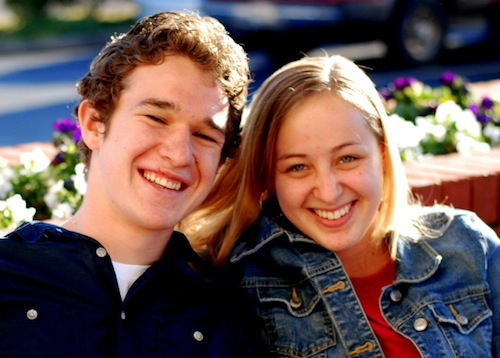 My second son, Noah, and his wife, Dassi, two months before their wedding in April, 2012.
My second son, Noah, and his wife, Dassi, two months before their wedding in April, 2012.Nine months after I became a Christian, in June of 1983, the military sent me on a remote assignment to Galena Air Station in the direct center of Alaska, right on the Yukon river.
There were only six committed Christians on that air station. There were others who called themselves Christians, but no one who was interested in Bible study or evangelism. I quickly got the six Christians together for Friday night Bible studies and prayer, and we would go pass out tracts to the eskimos in Galena village on our days off.
We did this for six weeks. That's how long it took for our doctrinal differences to divide us into six individual denominations. The brothers—it was almost exclusively men on that air station—were angry, and most of them wouldn't speak to one another.
I couldn't believe it. Not knowing anything better, I promised myself I would no longer be Assembly of God or any other denomination, but I would study the Scriptures honestly and hold only to what they clearly said.
 My third son, Caleb, in his sophomore year of college.
My third son, Caleb, in his sophomore year of college.Reading the Scriptures like that, and especially with as much time as I had in Galena, transformed my views, sometimes in some borderline heretical areas. In June of 1984 I was transferred to Germany.
I found myself somewhat of an outcast in churches. I had read Gene Edwards book, so I spoke about church life all the time. I talked about John 17:20-23 and how that prayer showed that without unity we could not prove to the world that Jesus was who he said he was. I talked about 1 Corinthians 3 and how calling ourselves Baptist and Pentecostal was no different than the Corinthians saying they were "of Paul" and "of Apollos."
Few listened, though I often gathered with the ones who did. The problem was, all of them were military. They couldn't live a together life with me because they were always being moved by the government.
I got out of the military in 1986, stayed in Germany, and married my wife, Lorie, the daughter of another military man, in 1987. Shortly before we left Germany in 1990, someone gave me a book called Will the Real Heretics Please Stand Up.
The Early Christian Writings
My "honest" reading of the Scriptures had caused me to question many accepted Evangelical doctrines. Tithing, for example, was obviously not a New Testament teaching. I wrestled with the role of faith and works in salvation, and I adopted a slightly adjusted explanation of the Trinity because it clearly fit Scripture better than the standard three co-equal persons theory.
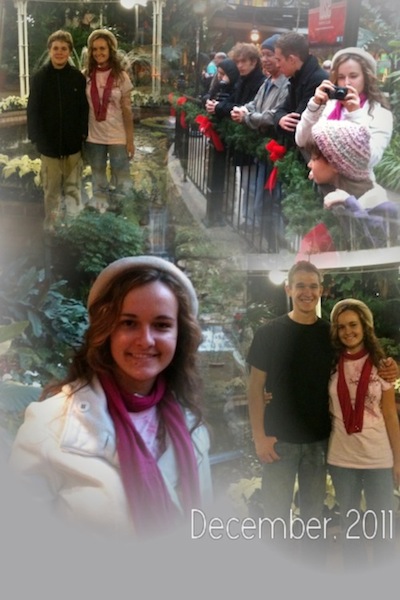 My fourth child and oldest daughter, Janelle.
My fourth child and oldest daughter, Janelle.The issue of the Trinity was especially "heretical" to Evangelicals. It was a taboo subject, and it couldn't even be discussed unless we were confirming and explaining the three co-equal persons idea.
My wife got a little frustrated one night with the constant friction I was creating in the church we attended. She asked me, "How do you know you're right?"
I told her, "I'm not right. I can't be. Only the church can be right, but I know that church we're attending is not right, either. They don't submit to the Scriptures nor even care very much what they say."
It was then that a friend asked me to review Will the Real Heretics Please Stand Up for him. He had read it, but he didn't trust himself to evaluate it. He thought I could do a better job.
I read it some that evening, then finished it at work the next day. (I was running a Christian bookstore for military personnel, so I could read between customers.) When I got home, my wife was sitting on the bed reading. I threw the book on the bed and said, "I'm on oddball now, but 18 hundred years ago, everyone agreed with me."
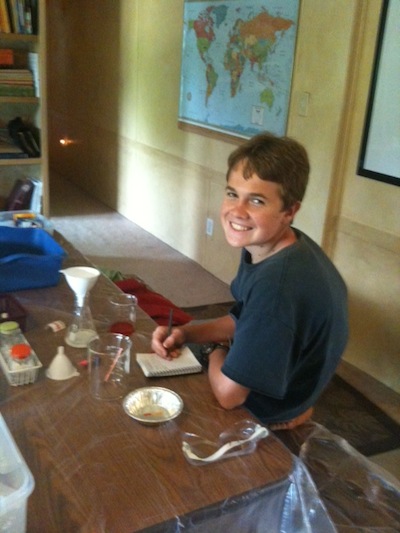 My fifth child and fourth son, Manuha, who plans to be a mad scientist.
My fifth child and fourth son, Manuha, who plans to be a mad scientist.The Heretics book, as we came to call it, was an evaluation of the writings of the second and third century church by a lawyer, a former Jehovah's Witness named David Bercot. He had a fascinating premise. He only covered doctrines that were addressed by at least five early Christian writers, and he only wrote on those subjects if all those writers agreed.
On my part, I didn't even know these "early Christian writings" existed. That offended me a little because I had read several large church history books trying to get some historical perspective on the things I believed.
Through the Heretics book, I was introduced to The Ante-Nicene Fathers, a 10-volume collection of just about everything the church wrote between the time of the apostles and the Council of Nicea (hence the adjective "ante-Nicene" or "pre-Nicene").
I was thrilled! Here in my hands was confirmation that my research in the Scriptures really had been honest. I had arrived at conclusions that the church had agreed on for centuries after the time of the apostle.
The Church and the Faith Once Delivered to the Saints
I became a crusader for that original faith. I even met David Bercot, and I joined him in Tyler, Texas in 1992 to form the Tyler Early Christian Fellowship. He promised to publish my book, The Canon and the Crowbar: How To Stop Bending the Bible to Fit Your Beliefs, but before that happened we had a falling out.
You may not know the kind of controversy that a group of radical families can bring when they come together as a church for the first time, especially if they think that unity is created by like-minded doctrine. We found out quickly and firsthand.
David wanted to impose some rules upon the church to end the conflicts brewing among us. I felt those rules were unscriptural and that we should ride out our problems.
At an impasse, we did nothing, and the conflicts only grew.
Finally, David grew tired of it, and he decided that he would join one of the ancient churches, such as the Roman Catholics or Orthodox, so that he could be ordained and have the authority he needed to settle the conflicts in the church.
I couldn't do that, so he asked me to leave. He told me I was too influential to stay, even if I didn't say anything against their joining an ancient church.
Catching Up to Today
I left. I returned to California, found another job, and went back to seeking people who wanted to share their lives with one another. I held Bible studies, baptized several people, and even had a radio show in Sacramento for about 6 months.
Eventually, the lack of fellowship and the temptations of city life were too much for me. I packed up my family, and we moved to Texas.
We didn't have much money, and it soon ran out. We wound up homeless, living next to Canyon Lake shortly after it closed for the winter. That was no problem, as it was warm in San Antonio, and closing the lake just meant that they were not collecting entrance fees for camping.
We had three small children at the time, but those 2 or 3 weeks camping before I found a job were among the best weeks my family ever had.
We had to trust God for our food, but he provided daily. I was selling posters and plaques that I had made at the flea market on weekends, and I was job hunting during the week. One day, I picked up a hitchhiker on the way back to our tent, and he had a broken washing machine at his house. I repaired it, and he gave me all the money he had, which was $12. It was enough to eat for a couple days.
I got a job, and we upgraded from a tent to an old RV that my father-in-law gave to us. Then my old boss in Sacramento called and asked me to open a warehouse for him in Tennessee. I agreed, and I've been running that warehouse for almost 20 years now.
In the meantime, I joined the church that would eventually become Rose Creek Village, as I mentioned above. I am one of the elders of that church and the leading teacher at this point.
In August, 2013 I moved to Memphis to be with two other couples already there. It is one thing to talk about church life. It is another to demonstrate it. We want people not just to hear, but to touch, taste, and handle of the love of God that has been poured upon his people.
Christian History
I have not stopped studying the writings of the early church, but the joyful fiasco that was the Tyler Early Christian Fellowship taught me some things.
I never published my book, The Canon and the Crowbar, though I still have the manuscript. (Thanks, mom, for saving it!) I no longer approve of the premise.
Unity does not come by doctrine. Unity comes from the Spirit of God. A people united by the Spirit of God will be led by that Spirit into a unity of faith (Eph. 4:3,13). Attempting to do that backwards does not work.
It is Ephesians that tells us this is true. In Ephesians 4:3, we are told to "diligently" maintain the unity of the Spirit in the bond of peace. This is what we need to work at. We need to do so, Paul goes on to say, "until we come to the unity of the faith" (v. 13).
Spiritual unity first, then doctrinal unity that is produced by the Spirit of God. Too much confidence in our own interpretation of Scripture leads to arguments, dissensions, and divisions. Modern Christians don't seem to know this, however, and so improving our interpretations of Scripture, or arguing about them, is the only way we know to approach unity.
We should be centering our lives on walking by the Spirit of God because "as many as are led by the Spirit of God, these are the children of God" (Rom. 8:14).
Just as the Holy Spirit bears witness with our spirit that we are God's children (Rom. 8:16), so he bears witness to our brothers and sisters, joining us together in the love of God, which is the perfect bond of unity (Col. 3:14).
The purpose of the Scriptures, we are told by Paul, is to equip us for every good work (2 Tim. 3:17). The Scriptures are profitable for teaching, for reproof, for correction, and for instruction in righteousness (2 Tim. 3:16). They are not profitable for doctrinal disputes, for these lead only to division (1 Tim. 6:3-5).
It is my hope that this site, Christian-history.org, will provide teaching from Scripture and Christian history that will show what the basics of the faith are, the faith that the apostles handed down to the churches.
Those basics are important issues to which we must cling. Beyond those basics, however, it is the job of the church to avoid disputing. Instead, we must focus on obedience to Christ, diligently defend the unity of the Spirit, and God himself will guide us into everything we need to know (1 Jn. 2:26-27).
This works. I have been watching it work with power for almost 20 years.
The Purpose of This Site
I want you to learn church history from this site. I believe my research has been careful, extensive, and honest. I have limited myself to issues that I know about, and I have been careful not to speculate and go beyond my knowledge.
As a result, there are gaps in details on this web site, especially through the Middle Ages. I am one man, and I have had to limit myself to learning pre-Nicene and Nicene Christianity, the Reformation, and the Christianity that surrounds me in the modern age. Anything else I cover on this web site is the work of other researchers that I am passing on.
What I really want you to get from this site, however, is a love for the church of God and the same hatred for division and the works of the flesh that God has. History is a learning tool, and I pray that it teaches you to love what benefits the kingdom of God and helps you to be "thoroughly equipped for every good work" (2 Tim. 3:17).
Where do I recommend starting on this site? I'd say the Early Christianity page. It is a very brief overview of the early churches with links to people, places, and events woven throughout. It's sort of an entrance portal to the world of primitive Christianity.
Early Church History Newsletter
You will be notified of new articles, and I send teachings based on the pre-Nicene fathers intermittently.
When you sign up for my newsletter, your email address will not be shared. We will only use it to send you the newsletter.